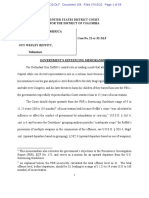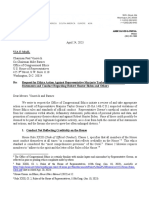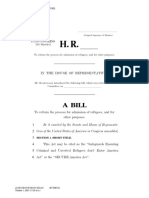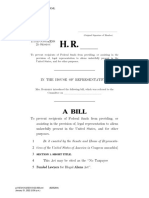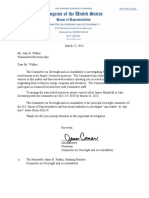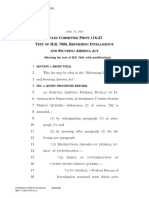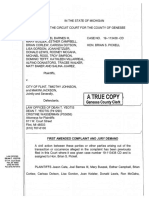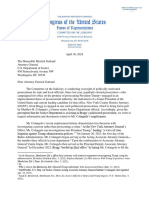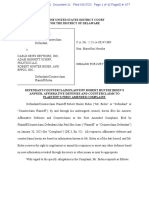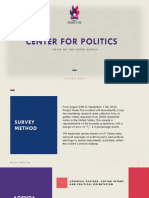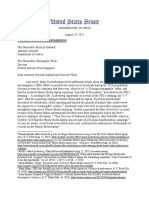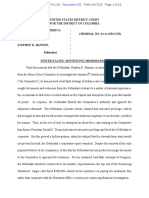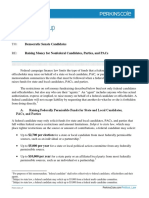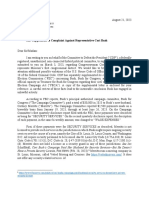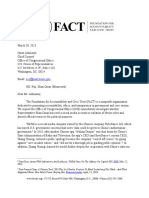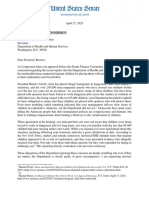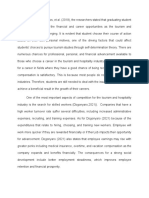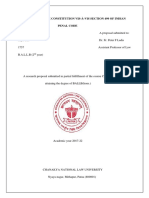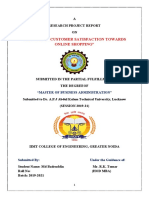Professional Documents
Culture Documents
Cori Bush FEC Complaint
Cori Bush FEC Complaint
Uploaded by
JoeSchoffstallOriginal Description:
Original Title
Copyright
Available Formats
Share this document
Did you find this document useful?
Is this content inappropriate?
Report this DocumentCopyright:
Available Formats
Cori Bush FEC Complaint
Cori Bush FEC Complaint
Uploaded by
JoeSchoffstallCopyright:
Available Formats
March 1, 2023
Ms. Lisa J. Stevenson
Acting General Counsel
Office of the General Counsel
Federal Election Commission
1050 First Street, NE
Washington, D.C. 20463
Email: [email protected]
COMPLAINT BEFORE THE FEDERAL ELECTION COMMISSION
RE: Rep. Cori Bush
Dear Ms. Stevenson,
The Foundation for Accountability and Civic Trust (FACT) is a nonprofit organization
dedicated to promoting accountability, ethics, and transparency in government and civic arenas.
We achieve this mission by hanging a lantern over public officials who put their own interests
over the interests of the public good. This complaint is submitted upon information and belief
that Rep. Cori Bush and her campaign committee may have used campaign funds for personal
use.1 We request the Federal Election Commission (FEC) investigate and if needed, take
appropriate enforcement actions.2
1This complaint is submitted pursuant to 52 U.S.C. § 30109(a)(1) and is against Cori Bush and her campaign
committee, Cori Bush for Congress.
2 “If the Commission, upon receiving a complaint . . . has reason to believe that a person has committed, or is about
to commit, a violation of [Act] . . . [t]he Commission shall make an investigation of such alleged violation.” 52
U.S.C. § 30109(a)(2); 11 C.F.R. § 111.4(a).
www.factdc.org • 1717 K Street NW, Suite 900, Washington, D.C., 20006 • Phone (202) 787-5860
Page 2 of 5
Federal law prohibits federal candidates from soliciting, receiving, directing, transferring,
or spending funds in connection with an election for federal office unless the funds are subject to
the limitations, prohibitions, and reporting requirements of the Act.3 Generally campaign funds
may only be spent for “bona fide campaign or political purposes,” with limited defined
exceptions such as: use to defray ordinary and necessary expenses incurred in connection with
holding federal office, charitable contributions, transfers to a political party, and donations to
state and local candidates.4 Federal law also provides certain examples of how campaign funds
may not be spent, of which one prohibited category of spending is for “personal use.”5
Payments that are not for bonafide services at fair market value could fall under one of
two prohibited categories—“payments to family members” or “gifts”. Candidates may not use
campaign funds for personal use.6 “Personal use means any use of funds in a campaign account
of a present or former candidate to fulfill a commitment, obligation or expense of any person that
would exist irrespective of the candidate's campaign or duties as a Federal officeholder.”7
Personal use includes: “Salary payments to a member of the candidate's family, unless the family
member is providing bona fide services to the campaign. If a family member provides bona fide
services to the campaign, any salary payment in excess of the fair market value of the services
3 52 U.S.C. §§ 30101, 30116, 30118.
4 11 C.F.R. § 113.2; U.S. House of Reps. Committee on Ethics, House Ethics Manual, at 121 (2022 Print)
(“Provisions of the Rules of the House of Representatives, including rules that require that campaign funds be used
only for campaign or political purposes, and prohibit their use for either personal or official House purposes, with
limited exceptions.”).
5 11 C.F.R. § 113.1(g).
6 52 U.S.C. § 30114 (b)(2).
7 11 C.F.R. § 113.1(g).
Page 3 of 5
provided is personal use.”8 Personal use also includes “gifts” greater than a “nominal value . . .
made on a special occasion.”9
During 2022, Bush’s campaign paid $571,856 for security services.10 Those payments
included $225,281 to PEACE Security, $62,359 to Cortney Merritts, and $50,000 to Nathaniel
Davis.11 The payments to Merritts were bi-monthly in the amount of $2,500.12 However,
reportedly Merritts does not have a St. Louis private security license, which is needed to perform
security services in the area that encompasses Bush’s entire district, nor does he appear within
the government database of licensed security professionals in the Washington D.C. area.13 It was
recently revealed that Bush has had a personal relationship with Merritts since before she took
office in 2021 and they were married in February 2023.14
At issue is this case is whether the payments made to Merritts were for a bona fide
service and at a fair market rate, and if not then they would be either a impermissible gift or a
payment to a family member. When a campaign negotiates salary payments with an unrelated
party, both sides negotiate for their best interest and generally fair market value is naturally
reached and paid for a service the campaign needs. However, when the campaign hires someone
8 11 C.F.R. § 113.1(g)(1)(i)(H).
“The candidate’s family includes (i) The spouse of the candidate; (ii) Any child, step-child, parent, grandparent,
sibling, half-sibling or step-sibling of the candidate or the candidate's spouse; (iii) The spouse of any child, step-
child, parent, grandparent, sibling, half-sibling or step-sibling of the candidate; and (iv) A person who shares a
residence with the candidate.” 11 C.F.R. § 113.1(g)(8).
911 C.F.R. § 113.1(g)(4) (“Gifts of nominal value and donations of a nominal amount made on a special occasion
such as a holiday, graduation, marriage, retirement, or death are not personal use, unless made to a member of the
candidate’s family.”).
Greg Wehner, Missouri Rep. Cori Bush, 'Squad' Democrat, Marries Campaign Security Guard: Reports, Fox
10
News, Feb. 26, 2023; Cori Bush for Congress, FEC.gov, Accessed Mar. 1, 2023.
11Id. The payments to Merritts totaled $62,359, with $60,000 being paid for security services and $2,359 for an
expense reimbursement. Id.
12Joe Schoffstall, Cori Bush’s Campaign Paid Her Husband for Security Services - But He Doesn't Have A Private
Security License, Fox News, Feb. 28, 2023; Cori Bush for Congress, FEC.gov., Accessed March 1, 2023.
13Joe Schoffstall, Cori Bush’s Campaign Paid Her Husband for Security Services - But He Doesn't Have A Private
Security License, Fox News, Feb. 28, 2023.
14 Id.
Page 4 of 5
with whom the candidate has a close personal relationship, there may be favoritism or an
incentive for the campaign to pay for services that are not necessary or pay above the fair market
value for those services. These types of payments are subjected to more scrutiny, especially when
other factors present indicate the payments were not for bona fide services at fair market value.
In this case Bush and Merritts clearly had a close relationship that resulted in marriage and there
are other factors present, namely that (1) the payments were regularly made at the same time the
campaign was apparently paying a security company for the exact same services and (2) the
payee did not have a license to perform the services for which he was being paid.
Based on the facts above, it appears Rep. Bush’s campaign may have made payments for
services that were unnecessary or above fair market value because of her personal relationship
with the payee. If so, these payments would qualify as either impermissible payments to a family
member or an impermissible gift. Therefore, we request the FEC investigate whether Rep. Bush
converted campaign funds for personal use by paying a salary that was not for bona fide services
at fair market value. Ultimately, if one or more campaign laws are found to have been broken, we
request the FEC hold the respondents accountable.
Page 5 of 5
Respectfully submitted,
_________________________________________
Kendra Arnold
Executive Director
Foundation for Accountability & Civic Trust
1717 K Street NW, Suite 900
Washington, D.C. 20006
Subscribed and sworn to before me on March _____, 2023.
__________________________________________
Notary Public
You might also like
- UPenn Foreign Donations FY 2023Document19 pagesUPenn Foreign Donations FY 2023JoeSchoffstallNo ratings yet
- (DAILY CALLER OBTAINED) - Banks 175 XMLDocument2 pages(DAILY CALLER OBTAINED) - Banks 175 XMLHenry RodgersNo ratings yet
- H.R. 7511, Laken Riley ActDocument9 pagesH.R. 7511, Laken Riley ActDaily Caller News FoundationNo ratings yet
- Governing For Impact's Internal Slide Deck On Its OperationsDocument15 pagesGoverning For Impact's Internal Slide Deck On Its OperationsJoeSchoffstall100% (1)
- AAF ComplaintDocument2 pagesAAF ComplaintJoeSchoffstall100% (1)
- UPenn Foreign Donations For Fiscal Year 2019Document5 pagesUPenn Foreign Donations For Fiscal Year 2019JoeSchoffstallNo ratings yet
- UPenn Foreign Donations For Fiscal Year 2022Document15 pagesUPenn Foreign Donations For Fiscal Year 2022JoeSchoffstallNo ratings yet
- Americans For Public Trust Lawsuit Against HHS, CDCDocument18 pagesAmericans For Public Trust Lawsuit Against HHS, CDCJoeSchoffstall100% (1)
- Sourcing Practices of Hugo BossDocument3 pagesSourcing Practices of Hugo BossVasant Kothari100% (1)
- Govt Sentencing Memo For Guy ReffittDocument58 pagesGovt Sentencing Memo For Guy ReffittDaily KosNo ratings yet
- Emails Show Teachers Unions Influenced Last-Minute CDC School Guidance, Received Copies Before Public ReleaseDocument7 pagesEmails Show Teachers Unions Influenced Last-Minute CDC School Guidance, Received Copies Before Public ReleaseJoeSchoffstallNo ratings yet
- NISM Securities Operations and Risk Management Practice Test - NISM SORMDocument22 pagesNISM Securities Operations and Risk Management Practice Test - NISM SORMSRINIVASAN100% (4)
- 3 PDFDocument59 pages3 PDFPushpam0% (1)
- Petition Under IBC For Recovery of Salary DuesDocument10 pagesPetition Under IBC For Recovery of Salary DuesAmrita JoshiNo ratings yet
- A Presentation On "Blades Inc. Case (Direct Foreign Investment) "Document10 pagesA Presentation On "Blades Inc. Case (Direct Foreign Investment) "devrajkinjal100% (2)
- Cori Bush For Congress LetterDocument5 pagesCori Bush For Congress LetterJames LynchNo ratings yet
- RESOLUTION Censuring Representative Rashida TlaibDocument3 pagesRESOLUTION Censuring Representative Rashida TlaibDaily Caller News FoundationNo ratings yet
- Felony Complaints Redacted CombinedDocument32 pagesFelony Complaints Redacted Combineddane100% (1)
- (DAILY CALLER OBTAINED) - Equit Shar Limit XMLDocument3 pages(DAILY CALLER OBTAINED) - Equit Shar Limit XMLHenry RodgersNo ratings yet
- Government Exhibit List in Fracker Robertson CaseDocument10 pagesGovernment Exhibit List in Fracker Robertson CaseDaily KosNo ratings yet
- Hunter Ethics LetterDocument5 pagesHunter Ethics LetterJamie WhiteNo ratings yet
- Mock vs. GarlandDocument2 pagesMock vs. Garlandstreiff at redstate100% (1)
- SECURE America ActDocument10 pagesSECURE America ActFox NewsNo ratings yet
- Boebert LegislationDocument3 pagesBoebert LegislationFox NewsNo ratings yet
- No Funding For Sanctuary Cities ActDocument15 pagesNo Funding For Sanctuary Cities ActFox NewsNo ratings yet
- Letter To DHS OIG On Afghan VettingDocument3 pagesLetter To DHS OIG On Afghan VettingFox NewsNo ratings yet
- (Daily Caller Obtained) - UsaidDocument4 pages(Daily Caller Obtained) - UsaidHenry Rodgers100% (1)
- Letter To Rob WalkerDocument1 pageLetter To Rob WalkerJames LynchNo ratings yet
- Brady Order Hunter BidenDocument1 pageBrady Order Hunter BidenJennifer Van LaarNo ratings yet
- (DAILY CALLER OBTAINED) - Free Speech Defense Act Bill TextDocument13 pages(DAILY CALLER OBTAINED) - Free Speech Defense Act Bill TextHenry RodgersNo ratings yet
- Letter To MayorkasDocument3 pagesLetter To MayorkasThe Western JournalNo ratings yet
- (Daily Caller Obtained) - File - 0338Document1 page(Daily Caller Obtained) - File - 0338Henry RodgersNo ratings yet
- ST Lucie County Sheriff InvestigationDocument24 pagesST Lucie County Sheriff InvestigationJoe HoNo ratings yet
- Aclu Aclu DC Amicus Brief United States V Trump DDC No 23 CR 257Document18 pagesAclu Aclu DC Amicus Brief United States V Trump DDC No 23 CR 257Libby EmmonsNo ratings yet
- (DAILY CALLER OBTAINED) - Standing Against Houthi Aggression Act - 118thcongressDocument3 pages(DAILY CALLER OBTAINED) - Standing Against Houthi Aggression Act - 118thcongressHenry RodgersNo ratings yet
- Turning Point Action Straw Poll America Fest 2023Document19 pagesTurning Point Action Straw Poll America Fest 2023Darian DouraghyNo ratings yet
- Exhibits - Racine GopDocument10 pagesExhibits - Racine GopJim HoftNo ratings yet
- RHB - CE - Show Cause Order - 7-24-24Document4 pagesRHB - CE - Show Cause Order - 7-24-24Susie Moore100% (1)
- Oversight Patrick Ho Documents LetterDocument5 pagesOversight Patrick Ho Documents LetterNick PopeNo ratings yet
- WarrantAmend XMLDocument9 pagesWarrantAmend XMLBreitbart NewsNo ratings yet
- Smith To BatdorfDocument3 pagesSmith To BatdorfWashington ExaminerNo ratings yet
- H. R. 6192Document16 pagesH. R. 6192The Western JournalNo ratings yet
- Read The Full Text of The Bill Here.Document83 pagesRead The Full Text of The Bill Here.zackNo ratings yet
- Flint, Michigan Settles Sexual Harassment, Discrimination Lawsuit - Details Released To PublicDocument28 pagesFlint, Michigan Settles Sexual Harassment, Discrimination Lawsuit - Details Released To PublicJim HoftNo ratings yet
- VSC Letter To AG MiyaresDocument2 pagesVSC Letter To AG MiyaresJoeSchoffstallNo ratings yet
- Jeremy Brown AppealDocument66 pagesJeremy Brown AppealCannConNo ratings yet
- 2024-04-30 JDJ To Garland Re ColangeloDocument3 pages2024-04-30 JDJ To Garland Re ColangeloThe Western JournalNo ratings yet
- OP Letter To SC HurDocument3 pagesOP Letter To SC HurJames LynchNo ratings yet
- Clark MotionDocument2 pagesClark MotionJames LynchNo ratings yet
- RNC Motion For Prelim InjunctionDocument71 pagesRNC Motion For Prelim InjunctionDaily KosNo ratings yet
- TIGTA ReportDocument22 pagesTIGTA ReportJames LynchNo ratings yet
- Hunter Biden Sues Laptop Repair Shop Owner Over Alleged Invasion of PrivacyDocument42 pagesHunter Biden Sues Laptop Repair Shop Owner Over Alleged Invasion of PrivacyrockstarmoNo ratings yet
- Daily Wire and Federalist Lawsuit Against State Department On Global Disinformation Index, Gabe KaminskyDocument67 pagesDaily Wire and Federalist Lawsuit Against State Department On Global Disinformation Index, Gabe KaminskyGabe KaminskyNo ratings yet
- Ukraine Bill April 17 2024Document49 pagesUkraine Bill April 17 2024Jennifer Van LaarNo ratings yet
- College Board LetterDocument2 pagesCollege Board Lettertempuser59No ratings yet
- Virginia SurveyDocument19 pagesVirginia SurveyThe Western JournalNo ratings yet
- (DAILY CALLER OBTAINED) - BILLS 118hconres19ihDocument3 pages(DAILY CALLER OBTAINED) - BILLS 118hconres19ihHenry RodgersNo ratings yet
- Huisha-Huisha V Alejandro N. Mayorkas, Secretary of Homeland Security in His Official Capacity, Et Al. Stay of InjunctionDocument2 pagesHuisha-Huisha V Alejandro N. Mayorkas, Secretary of Homeland Security in His Official Capacity, Et Al. Stay of InjunctionBob PriceNo ratings yet
- (DAILY CALLER OBTAINED) - Mexico VsmithwessonbriefamicuscuriaecruzjohnsonDocument32 pages(DAILY CALLER OBTAINED) - Mexico VsmithwessonbriefamicuscuriaecruzjohnsonHenry RodgersNo ratings yet
- Bertino Statement of OffenseDocument15 pagesBertino Statement of OffenseDaily KosNo ratings yet
- Via Electronic Transmission: Story, N. Revealed Their Waring Ahead of The Hunter Biden Laptop Story: Collusion', FDocument3 pagesVia Electronic Transmission: Story, N. Revealed Their Waring Ahead of The Hunter Biden Laptop Story: Collusion', FNew York PostNo ratings yet
- Bannon Sentencing MemoDocument24 pagesBannon Sentencing MemoDaily KosNo ratings yet
- Raising Money For Nonfederal Candidates, Parties and PacsDocument7 pagesRaising Money For Nonfederal Candidates, Parties and PacsAnonymous DqF4MJuwSNo ratings yet
- Cornelius v. NAACP Legal Defense & Ed. Fund, Inc., 473 U.S. 788 (1985)Document38 pagesCornelius v. NAACP Legal Defense & Ed. Fund, Inc., 473 U.S. 788 (1985)Scribd Government DocsNo ratings yet
- 2014-03-12 New York Progress and Protection PAC - Declaration of Clyde WilcoxDocument51 pages2014-03-12 New York Progress and Protection PAC - Declaration of Clyde WilcoxConnaissableNo ratings yet
- Head East LLC Complaint - Final With ExhibitDocument14 pagesHead East LLC Complaint - Final With ExhibitinforumdocsNo ratings yet
- EXCLUSIVE: Democrat Candidate Broke Law Not Disclosing 'Senior' Role in Venture Fund, Watchdog AllegesDocument3 pagesEXCLUSIVE: Democrat Candidate Broke Law Not Disclosing 'Senior' Role in Venture Fund, Watchdog AllegesGabe KaminskyNo ratings yet
- HA 20 000394 Closure Letter To CREWDocument5 pagesHA 20 000394 Closure Letter To CREWSally Jo SorensenNo ratings yet
- Bilbray RequestDocument7 pagesBilbray RequestUnnaturally_PoliticalNo ratings yet
- 12.6 FEC Complaint - GAGOP v. Jon Ossoff For Senate and The Georgia WayDocument7 pages12.6 FEC Complaint - GAGOP v. Jon Ossoff For Senate and The Georgia WayBreitbart NewsNo ratings yet
- June 14, 2000: FactsDocument4 pagesJune 14, 2000: Factschris_ashby1085No ratings yet
- 10 22 18 CLC Giffords NRA Hawley FinalDocument36 pages10 22 18 CLC Giffords NRA Hawley FinalKRCG 13No ratings yet
- Aaron Thompson PCDocument2 pagesAaron Thompson PCJoeSchoffstallNo ratings yet
- Education Trust's Email To Education Department OfficialsDocument24 pagesEducation Trust's Email To Education Department OfficialsJoeSchoffstallNo ratings yet
- Cori Bush Complaints From The Committee To Defeat The PresidentDocument8 pagesCori Bush Complaints From The Committee To Defeat The PresidentJoeSchoffstallNo ratings yet
- UPenn Foreign Donations For Fiscal Year 2020Document7 pagesUPenn Foreign Donations For Fiscal Year 2020JoeSchoffstallNo ratings yet
- Ethics Complaint Against Rep. Tony CardenasDocument12 pagesEthics Complaint Against Rep. Tony CardenasJoeSchoffstallNo ratings yet
- UPenn Foreign Donations For Fiscal Year 2021Document9 pagesUPenn Foreign Donations For Fiscal Year 2021JoeSchoffstallNo ratings yet
- National Education Association's (NEA) Tax FormsDocument108 pagesNational Education Association's (NEA) Tax FormsJoeSchoffstallNo ratings yet
- Ilhan Omar Hit With Ethics Complaint Over Alleged Abuse of Government ResourcesDocument12 pagesIlhan Omar Hit With Ethics Complaint Over Alleged Abuse of Government ResourcesJoeSchoffstallNo ratings yet
- Biden Admin Pressed Over 85,000 Unaccounted For Migrant Children Released Into USDocument2 pagesBiden Admin Pressed Over 85,000 Unaccounted For Migrant Children Released Into USJoeSchoffstallNo ratings yet
- House Majority Forward's 2020 Tax FormsDocument49 pagesHouse Majority Forward's 2020 Tax FormsJoeSchoffstallNo ratings yet
- WH Sets Up Meeting Between CDC Director and NEA PresidentDocument2 pagesWH Sets Up Meeting Between CDC Director and NEA PresidentJoeSchoffstallNo ratings yet
- House Majority Forward's 2020 Form 990Document49 pagesHouse Majority Forward's 2020 Form 990JoeSchoffstallNo ratings yet
- Majority Forward Tax FormsDocument22 pagesMajority Forward Tax FormsJoeSchoffstallNo ratings yet
- CDC Lacked School DataDocument2 pagesCDC Lacked School DataJoeSchoffstallNo ratings yet
- Majority Forward Tax FormDocument1 pageMajority Forward Tax FormJoeSchoffstallNo ratings yet
- CDC Internal Emails On School Reopening RolloutDocument2 pagesCDC Internal Emails On School Reopening RolloutJoeSchoffstallNo ratings yet
- Loudoun County School Contract With The Equity CollaborativeDocument2 pagesLoudoun County School Contract With The Equity CollaborativeJoeSchoffstallNo ratings yet
- WORK - MD04 - Requirement ListDocument13 pagesWORK - MD04 - Requirement ListRomar Jose Duran ZanottyNo ratings yet
- Edwin PDSDocument4 pagesEdwin PDSEdwin LimlengcoNo ratings yet
- (PS) Sakamoto v. US Office of Personnel Management - Document No. 6Document2 pages(PS) Sakamoto v. US Office of Personnel Management - Document No. 6Justia.comNo ratings yet
- Steffs RRLDocument9 pagesSteffs RRLsteffani GatanelaNo ratings yet
- Carnival Schedule RevisedDocument7 pagesCarnival Schedule RevisedChristian AribasNo ratings yet
- Singapore International Chamber of Commerce and VCargo Cloud Launch World's First Blockchain-Based E - Certificate of Origin (ECO)Document4 pagesSingapore International Chamber of Commerce and VCargo Cloud Launch World's First Blockchain-Based E - Certificate of Origin (ECO)WeR1 Consultants Pte Ltd100% (1)
- Statement May 18 XXXXXXXX5987Document4 pagesStatement May 18 XXXXXXXX5987Ankit BinjolaNo ratings yet
- Request For An ACCA Transcript: Data ProtectionDocument1 pageRequest For An ACCA Transcript: Data ProtectionRoshan PunnooseNo ratings yet
- The Cavite MutinyDocument7 pagesThe Cavite MutinyJang Ye BinNo ratings yet
- Who Is FilipinoDocument27 pagesWho Is FilipinoKristine Lagulay PontilarNo ratings yet
- Law ProspectusDocument47 pagesLaw ProspectusNavtej SinghNo ratings yet
- List of HospitalsDocument183 pagesList of HospitalsCarl PeNo ratings yet
- JJNJNDocument236 pagesJJNJNCassiane SantosNo ratings yet
- Power and Knowledge: June 2015Document8 pagesPower and Knowledge: June 2015ShatiJanzour TicketingNo ratings yet
- Emergence of Federal CourtDocument16 pagesEmergence of Federal CourtA.SinghNo ratings yet
- Day Trading by Matt KraterDocument46 pagesDay Trading by Matt KraterAshutosh100% (7)
- Irrigation Department: Government of Khyber PakhtunkhwaDocument4 pagesIrrigation Department: Government of Khyber Pakhtunkhwaalamgir BachaNo ratings yet
- Article 19 of The Constitution Vis-À-Vis Section 499 of Indian Penal CodeDocument7 pagesArticle 19 of The Constitution Vis-À-Vis Section 499 of Indian Penal CodeRiya GiriNo ratings yet
- Full Download Book Clinical Pharmacology During Pregnancy PDFDocument41 pagesFull Download Book Clinical Pharmacology During Pregnancy PDFruth.brown422100% (32)
- Civil Procedure II Sept 2022 Suppl ExamDocument3 pagesCivil Procedure II Sept 2022 Suppl Examelias zakariaNo ratings yet
- Six Months Certificate Course-Admission Circular-1 PDFDocument4 pagesSix Months Certificate Course-Admission Circular-1 PDFGirijashankar KhuntiaNo ratings yet
- Setiawan (2013) Urban Development and The Urban Planning Responses To Social Diversity and Potential Conflict in IndonesiaDocument429 pagesSetiawan (2013) Urban Development and The Urban Planning Responses To Social Diversity and Potential Conflict in IndonesiaOrlando Salazar FernandezNo ratings yet
- A Modelski and ThompsonDocument33 pagesA Modelski and ThompsonAndreea MitrofanNo ratings yet
- A Study On Customer Satisfaction Towards Online ShoppingDocument71 pagesA Study On Customer Satisfaction Towards Online ShoppingAyan Siddiqui100% (1)
- Chapter-10-History - (The Legacy of The Mughals)Document2 pagesChapter-10-History - (The Legacy of The Mughals)Adam shakilNo ratings yet









